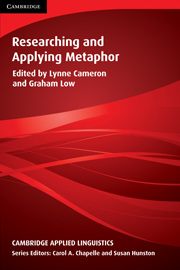Book contents
- Frontmatter
- Contents
- List of contributors
- Acknowledgements
- Conventions
- Series editors' preface
- Preface
- I KEY ISSUES IN METAPHOR RESEARCH
- 1 Operationalising ‘metaphor’ for applied linguistic research
- 2 Researching metaphor
- 3 Validating metaphor research projects
- II FROM THEORY TO DATA
- III ANALYSING METAPHOR IN NATURALLY OCCURRING DATA
- IV ANALYSING METAPHOR IN ELICITED DATA
- References
- Index
3 - Validating metaphor research projects
Published online by Cambridge University Press: 05 October 2012
- Frontmatter
- Contents
- List of contributors
- Acknowledgements
- Conventions
- Series editors' preface
- Preface
- I KEY ISSUES IN METAPHOR RESEARCH
- 1 Operationalising ‘metaphor’ for applied linguistic research
- 2 Researching metaphor
- 3 Validating metaphor research projects
- II FROM THEORY TO DATA
- III ANALYSING METAPHOR IN NATURALLY OCCURRING DATA
- IV ANALYSING METAPHOR IN ELICITED DATA
- References
- Index
Summary
Introduction
The extent to which applied linguistic researchers attempt to describe or control the validity of what they are doing appears to vary markedly. What is standard practice in psychology and sociology is not, at least in my experience, quite so standard when it comes to areas like language education, or even straight linguistic description. Essentially, any research report needs to include overt discussion of the extent to which the reader can be confident about the nature of the data which has been selected or omitted from the study, about the techniques of analysis and categorisation used, and about the extent to which the data support the conclusions proposed. It must, however, be admitted that, when it comes to applied language research, this is not always quite as simple a demand as it may at first sight appear.
The object of Chapter 3 is accordingly to examine some of these ‘not quite so simple’ aspects of validity, with respect to metaphor research projects and their method, data and conclusions. Validity will be taken in the very broad sense referred to above, of giving confidence to an observer that the data and the researcher's actions are appropriate to the task in hand. This is akin to the notion of validity developed in Messick (1980: 1014; see also Low, 1996b). The hope is that the paper will act as a bridge between the first two chapters of the book, which take a panoramic view, and the later chapters, the majority of which describe actual empirical studies.
Information
- Type
- Chapter
- Information
- Researching and Applying Metaphor , pp. 48 - 66Publisher: Cambridge University PressPrint publication year: 1999
Accessibility standard: Unknown
- 21
- Cited by
